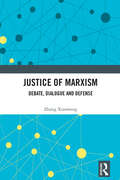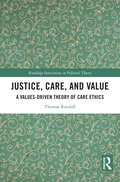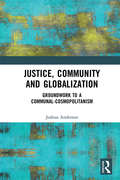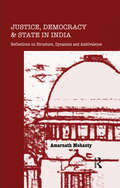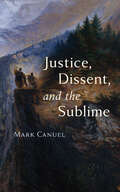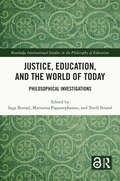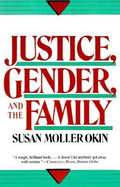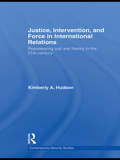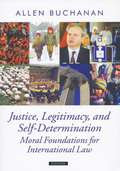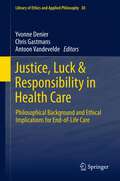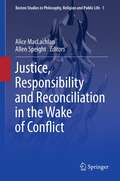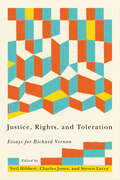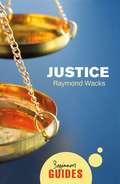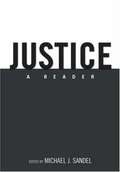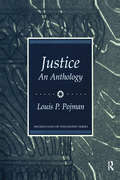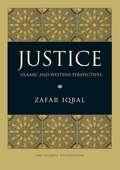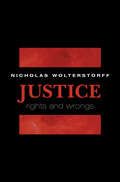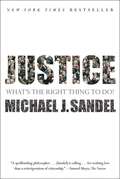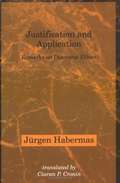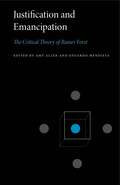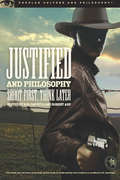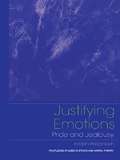- Table View
- List View
Justice of Marxism: Debate, Dialogue and Defense
by Zhang XiaomengThis book analyzes Marxian theories of justice within the context of contemporary political philosophy and intellectual history. Transcending perspectives from classical Marxism, the author analyzes how Western Marxism has engaged with critically and responded to the theories of justice, especially since the 1970s. The nine chapters cover major intellectual movements and multi-dimensional frameworks of thought that critique and understand anew the idea of justice, including anglophone debates on Marxism and justice, global distributive justice, and viewpoints from analytical Marxism, radical egalitarianism, the Frankfurt School, Marxian feminism and ecological Marxism. The second part of the book returns to the classical texts of Marxism, with a focus on historical materialism and a critique of capitalism to reinterpret basic tenets of justice in Marxism and to reconstruct Marxian theory of justice. This title will be of value to scholars and students interested in theories of justice, Marxian philosophy and political philosophy.
Justice, Care, and Value: A Values-Driven Theory of Care Ethics (Routledge Innovations in Political Theory)
by Thomas RandallIn Justice, Care, and Value Thomas Randall argues for the radical potential of care ethics as a distinct and preferable theory of distributive justice. Advancing the feminist literature, this book defends a vision of society that can best enable caring relations to flourish. Specifically, Randall proposes a values-driven theory of care ethics that derives normative criteria for evaluating the moral worth of caring relations and their surrounding institutions via a classification of the values of care. They argue that such a theory gives us unique and meaningful solutions to contemporary questions of distributive justice across personal, political, global, and intergenerational domains. In doing so, the book makes significant strides to engage care ethics with the broader moral and political philosophy literature. Topical and interdisciplinary, Randall demonstrates that care ethics has the conceptual resources to ground distributive theories of socialism, territorial and natural resource rights, obligations to future generations, and historic redress. The book will be of great interest to academics, researchers, and students of feminist philosophy, but also of liberalism, political economy, and theories of global and intergenerational justice.
Justice, Community and Globalization: Groundwork to a Communal-Cosmopolitanism
by Joshua AndersonThis book takes up the tension between globalization and community in order to articulate a new theory of global justice. Although the process of globalization is not new, its current manifestation and consequences are. At the same time, there is a growing recognition of the importance of community, identity and belonging. These two facts have generally been understood to be fundamentally in tension, both theoretically and descriptively. This book seeks to resolve this tension, and then draw out the implications for a theory of global justice and an understanding of the value and purpose of community. Importantly, the book argues, not only does an acceptance of the significance of the fact of globalization and the importance of community call for cosmopolitan duties and obligations, but it also calls into question the legitimacy and justification of the traditional nation-state. Aimed primarily at scholars working on issues related to political philosophy, globalization and global justice, the book will appeal to readers in law, politics, philosophy, and sociology.
Justice, Democracy and State in India: Reflections on Structure, Dynamics and Ambivalence
by Amarnath MohantyThis book explores how the liberal conception of justice with all its ideological underpinnings is reflected in the framing and working of the Constitution of India, in the adoption of broader socio-economic objectives, in the functioning of judicial and state institutions, and in the formulation and implementation of development strategy. It analyses the dynamics of the relationship between justice, democracy and the state. The book studies the liberal conception of social justice and its sufficiency, and interrogates its performance and adequacy within the structural parameters and cultural conditions of postcolonial India. It provides an analytical exposition of how the borrowed and inadequate conception of liberal justice and democracy inherited from colonial past, and the espousal of the derivative developmental pattern based on modernist and constructivist paradigm, have together failed to achieve the modest target of justice enshrined in the Constitution. Interlinking justice, democracy and state, the book examines their operational dynamics in an integrated framework which has relevance for other Third World countries also because of socio-economic and cultural commonalites.
Justice, Dissent, and the Sublime
by Mark CanuelRead the Romantics from the perspective of both political theory and literary studies—and consider justice through the lens of the sublime.In the past ten years, theorists from Elaine Scarry to Roger Scruton have devoted renewed attention to the aesthetic of beauty. Part of their discussions claim that beauty—because it arises from a sense of proportion, symmetry, or reciprocity—provides a model for justice. Justice, Dissent, and the Sublime makes a significant departure from this mode of thinking. Mark Canuel argues that the emphasis on beauty unwittingly reinforces, in the name of justice, the constraints of uniformity and conventionality. He calls for a more flexible and inclusive connection between aesthetics and justice, one founded on the Kantian concept of the sublime. The sublime captures the roles that asymmetry, complaint, and disagreement play in a complete understanding of a just society—a point, the author maintains, that was appreciated by a number of Romantic writers, including Mary Shelley.Canuel draws interesting connections between the debate about beauty and justice and issues in cosmopolitanism, queer theory, and animal studies.
Justice, Education, and the World of Today: Philosophical Investigations (Routledge International Studies in the Philosophy of Education)
by Marianna Papastephanou Torill Strand Inga BostadThis edited book challenges the limits of current educational philosophical discourse and argues for a restored normativisation of education through a powerful notion of justice. Moving beyond conventional paradigms of how justice and education relate, the book rethinks the promotion of justice in, for, and through education in its current state. Chapters combine international and diverse philosophical perspectives with a focus on contemporary issues such as climate change, the COVID-19 pandemic, racism, and migrant crises. Divided into three distinct parts, the book explores the ontological and socio-political grounds underlying our notions of education and justice, and offers self-reflective meta-critique on education philosophers’ tendency of promoting and upholding orthodox visions and missions. Ultimately, the book offers contemporary and innovative philosophical reflections on the link between justice and education, and enriches the discourse through a multi-perspectival and sensitive exploration of the topic. It will be of great interest to scholars, researchers, and postgraduate students in the fields of philosophy of education, education policy and politics, education studies and social justice.
Justice, Education, and the World of Today: Philosophical Investigations (Routledge International Studies in the Philosophy of Education)
by Marianna Papastephanou Torill Strand Inga BostadThis edited book challenges the limits of current educational philosophical discourse and argues for a restored normativisation of education through a powerful notion of justice.Moving beyond conventional paradigms of how justice and education relate, the book rethinks the promotion of justice in, for, and through education in its current state. Chapters combine international and diverse philosophical perspectives with a focus on contemporary issues, such as climate change, the COVID-19 pandemic, racism, and migrant crises. Divided into three distinct parts, the book explores the ontological and socio-political grounds underlying our notions of education and justice, and offers self-reflective meta-critique on education philosophers’ tendency of promoting and upholding orthodox visions and missions. Ultimately, the book offers contemporary and innovative philosophical reflections on the link between justice and education, and enriches the discourse through a multi-perspectival and sensitive exploration of the topic. It will be of great interest to scholars, researchers, and postgraduate students in the fields of philosophy of education, education policy and politics, education studies, and social justice.The Open Access version of this book, available at www.taylorfrancis.com, has been made available under a Creative Commons Attribution-Non Commercial-No Derivatives 4.0 license. Funded by University of Oslo.
Justice, Gender, And The Family
by Susan Moller OkinIn the first feminist critique of modern political theory, Okin shows how the failure to apply theories of justice to the family not only undermines our most cherished democratic values but has led to a major crisis over gender-related issues.
Justice, Intervention, and Force in International Relations: Reassessing Just War Theory in the 21st Century (Contemporary Security Studies)
by Kimberly A. HudsonThis book analyses the problems of current just war theory, and offers a more stable justificatory framework for non-intervention in international relations. The primary purpose of just war theory is to provide a language and a framework by which decision makers and citizens can organize and articulate arguments about the justice of particular wars. Given that the majority of conflicts that threaten human security are now intra-state conflicts, just war theory is often called on to make judgments about wars of intervention. This book aims to critically examine the tenets of just war theory in light of these changes, and formulate a new theory of intervention and just cause. For Michael Walzer, the leading scholar of just war theory, armed humanitarian intervention is permissible only in cases of genocide, ethnic cleansing, widespread massacres, or enslavement. This book shows why this threshold is too restrictive in light of the progressive shift away from interstate conflict as well as the emerging norms of 'sovereignty as responsibility' and the 'responsibility to protect'. Justice, Intervention and Force in International Relations aims to establish a new, stable foundation for non-intervention and a revised threshold for 'just cause'. In addition, this book demonstrates that over-reliance on the just cause category distorts understanding, analysis, and public discussion of the justice or injustice of resorting to war. This new book will be of much interest to students of ethics, security studies, international relations and international law. Kimberley Hudson is Assistant Professor of Political Science at American International College, and has a Phd in International Relations from Brown University.
Justice, Legitimacy, And Self-determination: Moral Foundations For International Law
by Allen BuchananThis book articulates a systematic vision of an international legal system grounded in the commitment to justice for all persons. It provides a probing exploration of the moral issues involved in disputes about secession, ethno-national conflict, 'the right of self-determination of peoples,'human rights, and the legitimacy of the international legal system itself. Buchanan advances vigorous criticisms of the central dogmas of international relations and international law, arguing that the international legal system should make justice, not simply peace, among states a primary goal, andrejecting the view that it is permissible for a state to conduct its foreign policies exclusively according to what is in the 'the national interest'. He also shows that the only alternatives are not rigid adherence to existing international law or lawless chaos in which the world's one superpowerpursues its own interests without constraints. This book not only criticizes the existing international legal order, but also offers morally defensible and practicable principles for reforming it. Justice, Legitimacy, and Self-Determination will find a broad readership in political science,international law, and political philosophy. Oxford Political Theory presents the best new work in political theory. It is intended to be broad in scope, including original contributions to political philosophy and also work in applied political theory. The series contains works of outstanding quality with no restrictions as to approach orsubject matter. Series Editors: Will Kymlicka, David Miller, and Alan Ryan
Justice, Luck & Responsibility in Health Care
by Chris Gastmans Antoon Vandevelde Yvonne DenierIn this book, an international group of philosophers, economists and theologians focus on the relationship between justice, luck and responsibility in health care. Together, they offer a thorough reflection on questions such as: How should we understand justice in health care? Why are health care interests so important that they deserve special protection? How should we value health? What are its functions and do these make it different from other goods? Furthermore, how much equality should there be? Which inequalities in health and health care are unfair and which are simply unfortunate? Which matters of health care belong to the domain of justice, and which to the domain of charity? And to what extent should we allow personal responsibility to play a role in allocating health care services and resources, or in distributing the costs? With this book, the editors meet a double objective. First, they provide a comprehensive philosophical framework for understanding the concepts of justice, luck and responsibility in contemporary health care; and secondly, they explore whether these concepts have practical force to guide normative discussions in specific contexts of health care such as prevention of infectious diseases or in matters of reproductive technology. Particular and extensive attention is paid to issues regarding end-of-life care.
Justice, Responsibility and Reconciliation in the Wake of Conflict
by Allen Speight Alice MaclachlanWhat are the moral obligations of participants and bystanders during--and in the wake of -a conflict? How have theoretical understandings of justice, peace and responsibility changed in the face of contemporary realities of war? Drawing on the work of leading scholars in the fields of philosophy, political theory, international law, religious studies and peace studies, the collection significantly advances current literature on war, justice and post-conflict reconciliation. Contributors address some of the most pressing issues of international and civil conflict, including the tension between attributing individual and collective responsibility for the wrongs of war, the trade-offs made between the search for truth and demands for justice, and the conceptual intricacies of coming to understand just what is meant by 'peace' and 'conflict.' Individual essays also address concrete topics including the international criminal court, reparations, truces, political apologies, truth commissions and criminal trials, with an eye to contemporary examples from conflicts in the Middle East, Africa and North and South America.
Justice, Rights, and Toleration: Essays for Richard Vernon
by Neil Hibbert, Charles Jones, and Steven LecceThe political theory of Richard Vernon has been a guiding light for students of politics for over five decades. From the situated ethics of shared citizenship to the normative character of individuals’ connections to members of other societies and generations, Vernon has cleared a distinctive course in his contributions to the many complex dimensions of political morality.Justice, Rights, and Toleration centres on the core ideas that animate Vernon’s approcach to political theory. Contributors to this volume – all former students and colleagues of Vernon – offer critical engagement with the fundamental themes threaded throughout the thinker’s work on the perennial political challenges in liberal democratic societies, including the understanding of citizenship and political membership, justice within and between nations and generations, the rights of children and parents, and the idea of toleration. Vernon articulated a clear vision of the nature of these problems as well as a nuanced approach to addressing them, one rooted in the ideas of democratic dialogue and justice. The essays in this volume are a testament to the breadth of the pressing issues on which Vernon’s work continues to advance critical insights.Justice, Rights, and Toleration provides a worthy tribute to the wide range of Richard Vernon’s interests and the inspiration still to be found in his deep yet subtle body of work in political theory.
Justice: A Beginner's Guide (Beginner's Guides)
by Raymond WacksIn this highly topical introduction, Professor Raymond Wacks explains and evaluates the leading theories of justice that have shaped our societies and their legislative and judicial systems, and explores the extent to which fundamental notions like fairness, equality and freedom are reflected in contemporary society. By analysing some of the world&’s most pressing challenges, including terrorism, corruption and migration, Justice: A Beginner&’s Guide shows how these ideas are applied in practice – and how far we still have to go to achieve social justice.
Justice: A Reader
by Michael J. SandelThe readings gathered in this volume are the ones I assign in my undergraduate course, "Justice," an introduction to moral and political philosophy that I have taught at Harvard, on and off, for over 25 years.
Justice: An Anthology
by Louis P. PojmanA comprehensive anthology on justice with readings that offer the different theories on the importance and placement of justice in society.The well-argued, accessible articlesencompass classic to contemporary theories and cover both positive and negative.
Justice: Islamic and Western Perspectives
by Zafar IqbalA thought-provoking monograph which provides a systematic and rigorous exposition of a range of social, economic and political views from the vantage point of Islam. Humanity is in a state of confusion and is torn apart by conflicting claims of civilization superiority. In the context of current misunderstanding on the east-west relationship, this comparative study will help to alleviate hostilities.
Justice: Rights and Wrongs
by Nicholas WolterstorffWide-ranging and ambitious, Justice combines moral philosophy and Christian ethics to develop an important theory of rights and of justice as grounded in rights. Nicholas Wolterstorff discusses what it is to have a right, and he locates rights in the respect due the worth of the rights-holder. After contending that socially-conferred rights require the existence of natural rights, he argues that no secular account of natural human rights is successful; he offers instead a theistic account. Wolterstorff prefaces his systematic account of justice as grounded in rights with an exploration of the common claim that rights-talk is inherently individualistic and possessive. He demonstrates that the idea of natural rights originated neither in the Enlightenment nor in the individualistic philosophy of the late Middle Ages, but was already employed by the canon lawyers of the twelfth century. He traces our intuitions about rights and justice back even further, to Hebrew and Christian scriptures. After extensively discussing justice in the Old Testament and the New, he goes on to show why ancient Greek and Roman philosophy could not serve as a framework for a theory of rights. Connecting rights and wrongs to God's relationship with humankind, Justice not only offers a rich and compelling philosophical account of justice, but also makes an important contribution to overcoming the present-day divide between religious discourse and human rights.
Justice: What's The Right Thing To Do?
by Michael J. Sandel"For Michael Sandel, justice is not a spectator sport," The Nation 's reviewer of Justice remarked. In his acclaimed book-based on his legendary Harvard course-Sandel offers a rare education in thinking through the complicated issues and controversies we face in public life today. It has emerged as a most lucid and engaging guide for those who yearn for a more robust and thoughtful public discourse. "In terms we can all understand," wrote Jonathan Rauch in The New York Times, Justice "confronts us with the concepts that lurk . . . beneath our conflicts. " Affirmative action, same-sex marriage, physician-assisted suicide, abortion, national service, the moral limits of markets-Sandel relates the big questions of political philosophy to the most vexing issues of the day, and shows how a surer grasp of philosophy can help us make sense of politics, morality, and our own convictions as well. Justice is lively, thought-provoking, and wise-an essential new addition to the small shelf of books that speak convincingly to the hard questions of our civic life.
Justification and Application: Remarks on Discourse Ethics
by Jürgen Habermas Ciaran P. CroninThis collection of four essays and an interview contains Habermas's most recent contributions to ethical theory. It expands and clarifies the work on discourse ethics presented in Moral Consciousness and Communicative Action. Here, largely in response to criticisms from contemporary neo-Aristotelians, Habermas underscores the claim of discourse ethics to a preeminent position in contemporary moral philosophy with incisive analyses and refinements of the central concepts of his theory that include important developments in his treatment of practical reason and of the problems of application and motivation. The first essay offers a comprehensive analysis of practical rationality, which establishes a clear demarcation between pragmatic, ethical, and moral questions and a corresponding differentiation between forms of volition and spheres of practical discourse. The centerpiece of the book is a multifaceted defense of the central claims of discourse ethics incorporating masterly critiques of the major competing positions, including those of John Rawls, Bernard Williams, Charles Taylor, Alasdair MacIntyre, Karl-Otto Apel, and Albrecht WellmerThe middle essays defend the basic intention of universalist moral theory in the face of the claims of the neo-Aristotelian ethics of the good and Horkheimer's skepticism toward reason that led him to embrace a religiously inspired ethic of compassion. An interview with Habermas covering such topics as the genesis of discourse ethics, the precise import of some of its more controversial elements, and its interconnections with the theory of communicative actions concludes this important collection. Jürgen Habermas is Professor of Philosophy at the University of Frankfurt.
Justification and Emancipation: The Critical Theory of Rainer Forst (Penn State Series in Critical Theory #2)
by Amy Allen Eduardo MendietaThis work is both an introduction to and a critical appraisal of the work of Rainer Forst, one of the most important political theorists in Germany today. Structured for classroom use, this collection of original essays engages with Forst’s extant corpus in ways that are both appreciative and critical.Forst is an original, prolific, and widely known member of the “fourth generation” of Frankfurt School theorists. His significant contributions include a Rawlsian-Habermasian conception of justice that takes seriously the dissent of citizens and moral agents; an original interpretation and analysis of the concept of toleration; and, most recently, a generative idea of “noumenal power,” to which every human being has a claim by virtue of their equal standing within the moral community of all rational beings. Opening with an essay by Forst on the normative conception of progress and closing with a reply to his critics, this volume is both a primer on and a window into the latest contributions to the tradition of critical theory.In addition to the editors, the contributors include John Christman, Mattias Iser, Catherine Lu, John P. McCormick, Sarah Clark Miller, and Melissa Yates.
Justification and Emancipation: The Critical Theory of Rainer Forst (Penn State Series in Critical Theory)
by John Christman Rainer Forst Catherine Lu John P. McCormick Mattias Iser Melissa Yates Sarah Clark MillerThis work is both an introduction to and a critical appraisal of the work of Rainer Forst, one of the most important political theorists in Germany today. Structured for classroom use, this collection of original essays engages with Forst’s extant corpus in ways that are both appreciative and critical.Forst is an original, prolific, and widely known member of the “fourth generation” of Frankfurt School theorists. His significant contributions include a Rawlsian-Habermasian conception of justice that takes seriously the dissent of citizens and moral agents; an original interpretation and analysis of the concept of toleration; and, most recently, a generative idea of “noumenal power,” to which every human being has a claim by virtue of their equal standing within the moral community of all rational beings. Opening with an essay by Forst on the normative conception of progress and closing with a reply to his critics, this volume is both a primer on and a window into the latest contributions to the tradition of critical theory.In addition to the editors, the contributors include John Christman, Mattias Iser, Catherine Lu, John P. McCormick, Sarah Clark Miller, and Melissa Yates.
Justification and the Truth-Connection
by Clayton LittlejohnThe internalism-externalism debate is one of the oldest debates in epistemology. Internalists assert that the justification of our beliefs can only depend on facts internal to us, while externalists insist that justification can depend on additional, for example environmental, factors. In this book Clayton Littlejohn proposes and defends a new strategy for resolving this debate. Focussing on the connections between practical and theoretical reason, he explores the question of whether the priority of the good to the right (in ethics) might be used to defend an epistemological version of consequentialism, and proceeds to formulate a new 'deontological externalist' view. His discussion is rich with insights and will be valuable for a wide range of readers in epistemology, ethics and practical reason.
Justified and Philosophy: Shoot First, Think Later
by Robert Arp Rod CarvethThe sharp-shooting authors in Justified and Philosophy take aim at many of the same philosophical problems that the Justified TV series grapples with. For instance, is Tim Olyphant's character, Deputy U.S. Marshal Raylan Givens, morally justified in using his Wild-Wild-West-style vigilante tactics to clean up Harlan County, Kentucky? <P><P>After all, the meth dealers, thieves, murderers, and other low-life scumbags all deserve what's coming to them, right? Not so fast, Quick-Draw McGraw! What about the law? What about a thorough and complete investigation of matters before dispensing so-called "justice"? What about the idea of the punishment fitting the crime?Deputy Marshal Givens wears a white hat and fights the "bad guys" so he must be a "good guy," right? His opponents are violent drug dealers, white supremacists, and thieves. Givens carries a badge, but when he shoots or kills people, is it always justified? What other choice does he have? Would any other method be as effective in rural eastern Kentucky where criminal activity is one of the few viable options for making a living?The coal-mining culture of Harlan County, Kentucky is an important backdrop to Justified, and the issues surrounding the coal industry are addressed in some chapters. Some of them include health problems like black lung, the dissolution of communities, the reduction in employment alternatives, the destruction of the environment with mountain-top removal and fracking, and the increase in crime and poverty. If Boyd Crowder robs the coal company responsible for exploiting his community, is that justified?The relationship between Boyd and Raylan dates back to a childhood friendship. Then when they older, they worked in the mines together. One chapter explores the character and motivation of both men and argues that each follows a different moral compass. Another chapter discusses the importance of family to the character of Mags Bennett and how that guides her actions and sense of duty. Another topic of discussion is whether the end justifies the means when Boyd and his gang destroy a meth lab and end up killing one of the meth cookers.Other chapters delve into a variety of fascinating philosophical themes that emerge in this modern-day cowboy show.
Justifying Emotions: Pride and Jealousy (Routledge Studies in Ethics and Moral Theory)
by Kristjan KristjanssonThe two central emotions of pride and jealousy have long been held to have no role in moral judgements, and have been a source of controversy in both ethics and moral psychology. Kristjan Kristjansson challenges this common view and argues that emotions are central to moral excellence and that both pride and jealousy are indeed ingredients of a well-rounded virtuous life.
